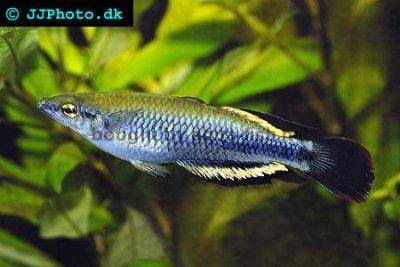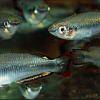Rainbowfish - Bedotia madagascariensis
Scientific name: Bedotia madagascariensis
Common name: Rainbowfish
Family: Bedotiidae
Usual size in fish tanks: 7 - 10 cm (2.76 - 3.94 inch)
014
Recommended pH range: 5.4 - 7.1
Recommended water hardness: 9 - 19°N (160.71 - 339.29ppm)
0°C 32°F30°C 86°F
Recommended temperature range: 22 - 25 °C (71.6 - 77°F)
The way how these fish reproduce: Spawning
Where the species comes from: Africa
Temperament to its own species: peaceful
Temperament toward other fish species: peaceful
Usual place in the tank: Top levels
Food and feeding
Rainbowfish are omnivorous and will accept a wide variety of foods, making them easy to feed in an aquarium. A staple diet of high-quality flake or pellet food is essential to meet their nutritional needs. However, to keep them in optimal health and enhance their coloration, supplement their diet with live or frozen foods such as bloodworms, brine shrimp, and daphnia. Including meaty foods ensures they receive the necessary proteins for growth and vitality. It's also beneficial to offer some vegetable matter, such as spirulina-based flakes, to maintain a balanced diet.
Origin
Rainbowfish are endemic to the rivers and streams of Madagascar, specifically in the eastern parts of the island. Bedotia madagascariensis, also known as the Madagascar Rainbowfish, inhabit freshwater environments with moderate flow and are often found in densely vegetated areas. Due to habitat loss, their populations in the wild are declining, making them a valuable species in the aquarium trade, as breeding efforts help maintain the population.
Sexing
Sexing Rainbowfish can be relatively straightforward. Males tend to be more vibrantly colored, especially during the breeding season, and will develop elongated dorsal and anal fins. They are also typically more slender than females, which tend to have a rounder, fuller body shape, especially when carrying eggs.
Breeding
Breeding Bedotia madagascariensis in captivity is achievable with the right setup. A well-planted tank with fine-leaved plants or spawning mops will provide the ideal environment for egg-laying. Males will perform courtship displays by extending their fins and displaying vibrant colors to attract females. The females will then scatter eggs throughout the plants, with each egg attaching to surfaces via sticky threads. The eggs generally hatch after about 10 days, depending on water temperature. The fry should be fed on Infusoria or commercially available liquid fry foods before progressing to newly hatched brine shrimp as they grow.
Lifespan
The expected lifespan of Rainbowfish in captivity can vary. Under optimal conditions, they can live for up to 3-5 years, though some may have shorter lifespans, sometimes only around 1-2 years, depending on their environment and care.
Short description
Madagascar Rainbowfish are peaceful schooling fish that should be kept in groups of at least 6 to thrive. They do best in aquariums that mimic their natural environment - tanks with dense plantings along the sides and open swimming spaces in the center. These fish appreciate a moderate current and well-oxygenated water. Due to their active swimming habits and social nature, a minimum tank size of 30 gallons (~25 Imperial gallons, ~110 liters) is recommended. Additionally, they prefer slightly alkaline water with a pH ranging from 7.0 to 8.0 and a temperature between 22-26°C (72-79°F). Regular water changes are essential for their health.
Pictures
Bought by aqua-fish.net from jjphoto.dk.




 Madagascar
Madagascar